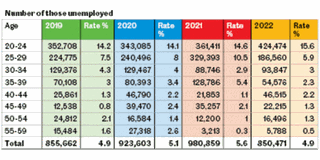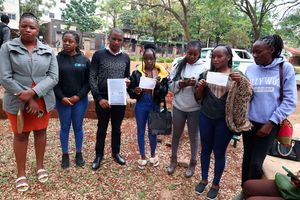Youths work on the streets of Elburgon town in Nakuru County under the Kazi Mtaani Initiative on July 14, 2022. The programme was recently relaunched by the government after a one-year break.
If the State’s plan to create jobs for 90,000 youth through a Sh9.2 billion World Bank loan had worked, thousands of unemployed Kenyans would have received a lifeline.
But the Kenya Youth Employment Opportunities Programme (KYEOP) flopped as the government burned billions of shillings, leaving the stinky youth unemployment problem messier than when the initiative started in 2017.
By the time KYEOP ended in June last year, Sh15 billion had been pumped into it, with the Sh9.2 billion loan said to have benefited 87,432 youth through business start-up grants (BSG), business development services and business plan competitions to beneficiaries.
Some 248 youth got Sh3.6 million grants each, 435 received Sh900,000 grants each and each of 78,000 young people got Sh40,000.
But auditors could not trace majority of these beneficiaries last year since they were unreachable on phone or refused to give auditors directions to their premises, raising doubts that much of the money may have gone to “ghost beneficiaries”.
“For instance, out of the 308 BSG beneficiaries sampled, 98 were unreachable on phone to give directions to their businesses while 119 were non-cooperative and declined to give audience to the audit team.
Sh28 billion
“This raised doubts as to whether their businesses were up and running or they were existing beneficiaries,” the report of a special audit on the initiative stated.
Even before the ink on KYEOP reports dried, Kenya last year tapped another loan of Sh28 billion from the World Bank to start a similar programme.

The National Youth Opportunities Towards Advancement (Nyota) targets to offer 800,000 form four level and below youth business skills, start-up grants and jobs as a way of addressing unemployment.
The lender in February said the first batch of 20,000 beneficiaries were expected to be on board by June.
“As of January 2025, the World Bank has disbursed $13.2 million (Sh1.7 billion) equivalent, representing 6 per cent of the total project funding to support interventions for the first cycle of youth intake expected to reach up to 20,000 youth and support strengthening of requisite capacity and delivery systems,” the bank said.
Nyota has been modelled on the KYEOP framework but the World Bank says that following the KYEOP audit findings, it has introduced mitigations such as tracking funding through blockchain.
“An enhanced Monitoring and Evaluation (M&E) system which includes process automation, digital tools and direct feedback collection from beneficiaries was introduced. The NYOTA project will also employ blockchain technology to trace funds disbursement from the World Bank to the end beneficiaries,” it said in a statement.
Another initiative to create jobs for some 2,080 youths through a Sh4.7 billion ($36.3 million) loan from the African Development Bank (AfDB) is also flopping, with an audit revealing huge gaps that have left the initiative mimicking other failed programs.
The ENABLE Youth Kenya programme—a skills and capacity development initiative to empower youths in agribusiness—was started in January 2018 and should have ended in 2022 if everything went according to plan.
At the time ENGAGE was started, Kenya was producing 500,000 youth from universities and colleges annually, but the number has since climbed to 800,000, and the programme is struggling.
While the programme deadline was extended to June, a recent audit revealed that just less than a third ($10.46 million) of the funding had been used by June last year and it continues to be hindered by gaps such as improper incubation of beneficiaries.
“The project targeted to train a total of 2,080 youth in four cohorts, each comprising of 520 youths. Review of documents, however, revealed only 432 youth in the first two cohorts or 21% of the total targeted youths, had been trained and successfully incubated,” an audit report for the year ending June 2024 indicated.
Academics and economists term the government’s initiatives as tick-box exercises rather than programmes meant to create impact on the economy, and finger development lenders for loaning Kenya to implement projects that are just money pits.
“Unfortunately, Kenya government interventions tend to be captured by short-term political interests, have limited scale, are unstructured and have a tick-box approach,” says Mr James Shikwati, a Nairobi-based economist.
Mr Shikwati says the focus should instead be on investing in re-skilling the youth to position them for the labour market since universities and colleges are not producing the skills the economy needs.
“The country’s political class needs to concretely demonstrate that it has confidence in its youth, provide incentives to employers and to initiatives that re-skill and up-skill the youth. This will trigger formalisation of initiatives that are currently absorbing over 70 per cent of Kenyan youth on low pay in the informal sector to strive to scale their operations,” he says.
Youth Affairs, Creative Economy and Sports Cabinet Secretary Salim Mvurya did not respond to questions regarding the initiatives the government has undertaken to create jobs for the youth.
University of Nairobi economics professor, Samuel Nyandemo, says the government lacks clear-cut policies on how to address unemployment and the education system is producing a higher number of graduates than the economy can absorb, hence the growing unemployment problem.
He also says the government jobs programmes collapse because of corruption, which has seen much of the funds end up in people’s pockets.
“If the lenders are concerned about how the money they provide to support employment creation in Kenya ends up being used, they should change tack and channel the money through non-governmental entities that are more accountable and make proper follow-ups,” Prof Nyandemo says.
Across all the initiatives, all that has changed has been their names, but their model has been the same. And as the government’s job programmes flop one after the other, desperation grows among Kenya’s unemployed youth.

Guests during the launch of the MbeleNaBiz Business Plan Competition under the Kenya Youth Employment and opportunities Project by the World Bank and the government on July 10, 2019.
Cases of young people leaving the country for menial jobs in the Middle East, others being scammed with promises to get jobs abroad and locally, and youth who had left the country thinking they would get jobs only to be forced to perform inhumane tasks overseas, are growing.
Sights of youth holding placards listing their qualifications are also becoming a normal phenomenon in the streets.
To make the initiatives more impactful, the Auditor-General advised that beneficiaries should repay a portion of the funding they get through the programmes to “remove the notion of free money” and make them more accountable.
According to the Kenya National Bureau of Statistics latest unemployment report, Kenyans in their 20s formed nearly three-quarters (71.8 per cent) of the unemployed population of 850,471 by 2022.
Since coming into office in 2022, President William Ruto embarked on an aggressive drive to send Kenyans for jobs abroad through a number of initiatives. But recent revelations of how youth were scammed to pay thousands of shillings through the State initiative only to be abandoned are having many who hoped to benefit through the government schemes reconsider them.
“Since late 2022, over 240,000 Kenyans have been supported in accessing overseas employment opportunities through government-led interventions,” said Diaspora Affairs Principal Secretary Roseline Njogu.
The State Department for Diaspora Affairs says it currently has five initiatives to support Kenyan youth to get jobs, including Kazi Majuu, launched in March across major towns in the country “to connect youth with global employers”.
The government also created the Diaspora Placement Agency in 2023 as a central hub for international job placements and has served as where the youth register for vacancies abroad.
“The agency vets’ opportunities and matches candidates’ skills to employers, ensuring transparency,” Ms Njogu said.








